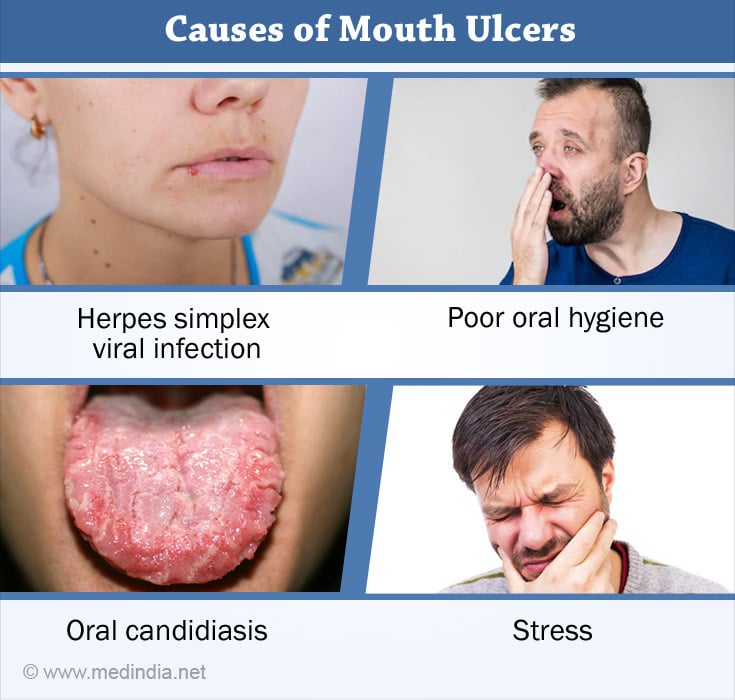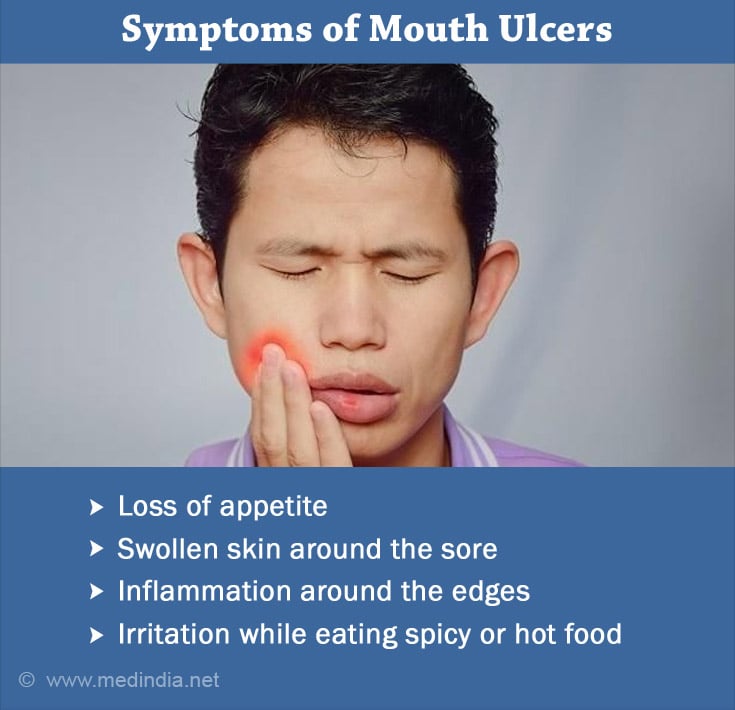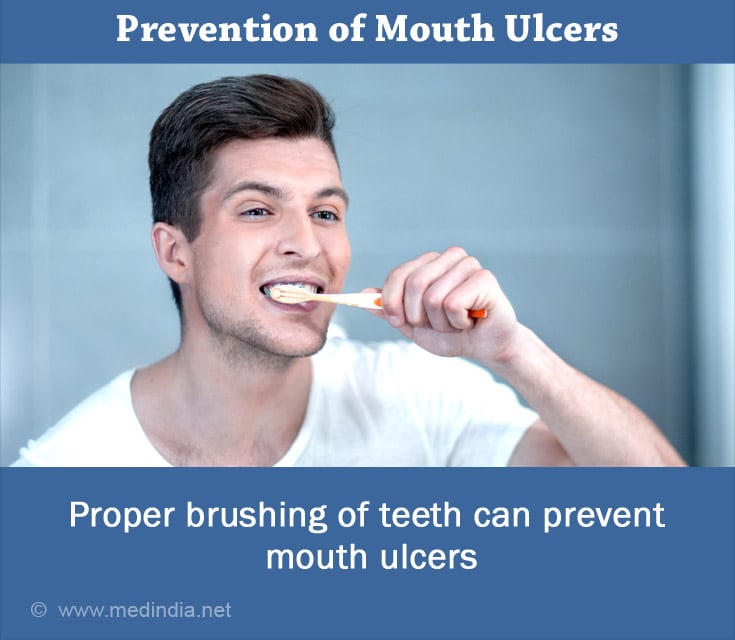- Mouth Ulcers - (https://www.dentalhealth.org/mouth-ulcers)
- About Mouth Ulcers - (https://www.healthnavigator.org.nz/health-a-z/m/mouth-ulcers/)
- Mouth Ulcers - Conditions and Treatments - (https://www.betterhealth.vic.gov.au/health/conditionsandtreatments/mouth-ulcers)
- Mouth Ulcer - Wikipedia - (https://en.wikipedia.org/wiki/Mouth_ulcer)
- What Causes Mouth Ulcers and How to Treat Them - (https://www.healthline.com/health/mouth-ulcers)
- Liquorice Mouth Wash as Treatment for Mouth Ulcer - (https://www.researchgate.net/publication/257353861_liquorice_mouth_wash_as_treatment_for_mouth_ulcer)
- Caring for My Teeth and Gums - (https://www.dentalhealth.org/caring-for-my-teeth)
- Mouth Ulcers - NHS - (https://www.nhs.uk/conditions/mouth-ulcers/)
What are Mouth Ulcers?
Mouth ulcers are caused by damage to the skin inside the mouth, leading to pain. They typically appear red, yellow, or white. These ulcers are delicate, making routine activities like eating, drinking, and brushing uncomfortable. An alternate name for a mouth ulcer is an oral ulcer or mucosal ulcer (1✔ ✔Trusted Source
Mouth Ulcers
Go to source).
Type of Ulcers in the Oral Cavity
Herpetiform Ulceration (HU):
Herpetiform ulcers are a specific kind of mouth sore, similar in appearance to herpes sores but not contagious like herpes. These ulcers come back very quickly and might seem like they never improve.Minor Ulcers:
These are small mouth sores, ranging from about 2 to 8 millimeters in size. They usually take up to 2 weeks to heal and cause mild pain.Major Ulcers:
Bigger than minor ulcers, major ulcers are often unevenly shaped, might be raised, and go deeper into the tissue. They can take a few weeks to disappear and often leave behind scar tissue once they heal.Causes of Mouth Ulcers
Several factors or conditions can lead to the development of mouth ulcers, including:
- Poor oral hygiene
- Injury from a toothbrush
- Burns after eating hot food
- Irritation from mouthwash
- Cheek biting
- Nutrient deficiencies of vitamin B12, folic acid, zinc and iron
- Oral candidiasis
- Weak immune system
- Celiac disease
- Behcet’s disease
- Syphilis infection
- Malignancy
- Dry Mouth
- Tooth decay
- Herpes simplex viral infection
- Drug reaction, such as chemotherapeutic agents
- Hand-foot-mouth syndrome
- Diseases like AIDS, tuberculosis, inflammatory bowel disease and diabetes mellitus
- Quitting smoking can lead to mouth ulcer in the first few days, which later subsides on its own
- Stress(2✔ ✔Trusted Source
About Mouth Ulcers
Go to source)

Symptoms and Signs of Mouth Ulcers
The symptoms of mouth ulcer depend on the underlying cause, but it may include:
- Round or oval shaped sores in the mouth which can be yellow, white or gray in color
- Irritation and pain while eating spicy or hot food
- Swollen skin around the sore
- Inflammation around the edges
- Difficulty in maintaining oral hygiene
- Loss of appetite(3✔ ✔Trusted Source
Mouth Ulcers - Conditions and Treatments
Go to source)

Diagnosing Mouth Ulcers
Diagnosing mouth ulcers is often straightforward. However, doctors may conduct several investigations to identify the exact cause when ulcers recur.
- Physical Examination - Your primary care doctor will carefully inspect your mouth and gather your medical history to reach a conclusion.
- Blood Tests - The blood tests include:
- Complete Blood Count (CBC): Checks overall health and looks for issues like infection, anemia, or leukemia.
- Erythrocyte Sedimentation Rate (ESR): Provides clues about inflammation in the body.
- Serum Ferritin: Evaluates the amount of iron present in the body. Iron deficiency can lead to recurrent mouth sores.
- Serum Vitamin B12: Assesses the amount of vitamin B12 in the body. Vitamin B12 deficiency can lead to recurrent aphthous ulcers.
- Skin Biopsy - A small skin tissue is taken for analysis in a medical laboratory.(4✔ ✔Trusted Source
Mouth Ulcer - Wikipedia
Go to source)
Treating Mouth Ulcers
Most mucosal ulcers resolve on their own. If they recur frequently, it's advisable to seek medical attention. While expediting the recovery process for oral ulcers can be challenging, managing symptoms and complications is possible.(5✔ ✔Trusted Source
What Causes Mouth Ulcers and How to Treat Them
Go to source)
Treatment depends on the type of oral ulcer.
- Painful ulcers may respond to anesthetic gels as they reduce pain.
- Some may require steroid gels, antiseptic gels, or anti-inflammatory drugsto speed up healing.
- Staying hydrated by drinking lots of liquids is important as dryness worsens ulcer problems.
- Licorice a commonly used herb in Ayurvedic medicine, contains compounds with anti-ulcer and antibacterial properties that can help treat mouth ulcers.
- Painkillers like paracetamol can be taken if the pain is unmanageable.
- Avoid spicy and sour foods until the ulcer heals.
- Rinse your mouth frequently with warm, slightly salted water.
- Maintain good oral hygiene by brushing and flossing.
- Treat candidiasis with anti-fungal drugs.
- Use anti-viral
drugs to treat herpes simplex virus infection. - Rinse your mouth with a medicated mouthwash(6Liquorice Mouth Wash as Treatment for Mouth Ulcer
Go to source).

Preventing Mouth Ulcers
Practices to prevent mouth ulcers include:
- Brushing teeth carefully to avoid damaging delicate oral mucosa
- Regular flossing
- Brushing teeth with a soft/medium toothbrush twice a day

- Control in cheek biting habits
- Regular visits to the dentist
- Consuming a well-balanced diet
- Managing stress levels
- Monitoring underlying diseases like diabetes mellitus or inflammatory bowel disease.(7✔ ✔Trusted Source
Caring for My Teeth and Gums
Go to source, 8✔ ✔Trusted Source
Mouth Ulcers - NHS
Go to source)










